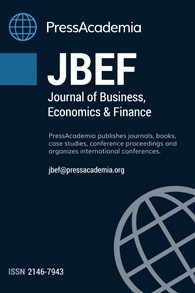Deficiencies of Turkish SMEs with Regard to Sustainability, Corporate Governance and Accounting Policies
Deficiencies of Turkish SMEs with Regard to Sustainability, Corporate Governance and Accounting Policies
Today's ever-growing challenges in local and global economies pose threats for the sustainability of Small and Medium-sized Enterprises (SME). As multinational companies invade local markets, local businesses continually suffer. In addition to financial distress, internal dynamics such as fraud, transparency matters, and business ethics play principal roles for jeopardizing the sustainable life spans of SMEs as well. By the same token, violating going concern by employing manipulative accounting methods to adjust financial statements merely act as a palliative measure. The aim of this paper is to investigate the deficiencies of SMEs and propose remedies to cure these areas. Data is collected from 104 Turkish accounting professionals by means of survey method. Findings of the study uncover an imperative implication that if Turkish SMEs wish to have sustainable life spans, they need to allocate the most extent of emphasis on the variables that make up the internal information systems factor some of which are efficiently functioning reporting and accounting system, effective organizational structure in addition to effective politics and procedures. Results of this study will be fruitful for not only academics but also for the industry in terms of pointing out what specific areas need improvements in the name of sustaining the survival of SMEs.
Keywords:
Sustainability, corporate governance, going concern transparency, SMEs.,
___
- Agan, Y., Acar, M. F. and Borodin, A. (2013), Drivers of environmental processes and their impact on performance: a study of Turkish SMEs, Elsevier, Journal of Cleaner Production, 51 (2013) pp. 23-33.
- Akdoğan, N. (2010), KOBİ Finansal Raporlama Standardına Genel Bakış ve Tam Set IAS/IFRS'lerden Farklılığı, Muhasebe ve Denetime Bakış, Ocak 2010, pp. 1-26.
- Aksoy, T. and Bozkuş, S. (2008), The Major Effects of Basel II to Small and Medium-Sized Enterprises: An Empirical Work on Companies Quoted to KOSGEB, The World of Accounting Science, Vol. 10, Issues.2, pp.55-79.
- Bataglia, M. (2008), Encyclopedia of Survey Research Methods, Publication date: 2008, DOI: http://dx.doi.org/10.4135/9781412963947 , ISBN: 9781412918084
- Borga, F., Citterio, A., Noci, G. and Pizzurno, E. (2009), Sustainability Report in Small Enterprises: Case Studies in Italian Furniture Companies, Business Strategy and the Environment Bus. Strat. Env. 19, pp.162–176 (2009).
- Capital Market Boards of Turkey (2005), Kurumsal Yönetim İlkeleri, pp.2.
- Deloitte Touche Tohmatsu (2007), Aile Sirketleri için Adım Adım Kurumsal Yönetim, Corporate Governance Association of Turkey, Kurumsal Yönetim Serisi, Türkiye Kurumsal Yönetim Derneği ve Deloitte Ortak Yayını
- Ferrel, O. C., Hirt, G. A. and Ferrel, L. (2011), Business: A Changing World, McGraw-Hill International Edition, pp. 151-159.
- Hahn T. and Scheermesse, M. (2006), Approaches to Corporate Sustainability Among German Companies", Corporate Social Responsibility and Environmental Management.
- Hoverstadt, P. and Bowking, D. (2005), Organizational Viability as a Factor in
- Sustainable Development of Technology, International Journal of Technology Management and Sustainable Development, V.4, N.2, pp.131-146. IMKB (2011), Sürdürülebilirlikle İlgili Özet Bilgiler, İMKB İstatistik Müdürlüğü, Mayıs 2011.
- Imoniana, J. O., Perera, L. C. J., Lima, F. G. and Antunes, M. T. P. (2011), The Dialectic of Control Culture in SMEs: A Case Study, International Journal of Business Strategy, Vol. 11, No. 2. Kaya, C. T. (2011), The Modeling & Operationalization of Basel II Accord for Turkish SMEs, Lambert Academic Publishing GmbH & C0. KG, Leipzig, Germany, ISBN-13: 9783845422794, pp. 29.
- Kuşat, N. (2012), Sürdürülebilir İşletmeler İçin Kurumsal Sürdürülebilirlik ve İçsel Unsurları, Afyon Kocatepe Üniversitesi, İİBF Dergisi, C.XIV, S II, pp. 228-229.
- Laurinkeviciute, A. and Stasiskien, Z. (2011), SMS for decision making of SMEs, Clean Technical Environment Policy (2011) 13: 797–807, DOI 10. 1007/s10098011-0349-1.
- Lipczynski, J. (2008), Little Book of Ideas: Business, A&C Black Publishers Ltd., Elwin Street Limited, pp.52.
- Lohrke, F., Kreiser, P. M. and Weaver, K. M. (2006), The Influence of Current Firm Performance on Future SME Alliance Formation Intentions: A Six-Country Study, Journal of Business Research, 59, pp. 19-27.
- Official Journal of the European Union (2003), Extract of Article 2 of the Annex of Recommendation 2003/361/EC, L 124, pp. 36 of 20 May 2003.
- Peter, T. (1994), The Tom Peters Seminar: Crazy Times Call for Crazy Organizations, A Vintage Original, Excel/A California Partnership, March 1994.
- Santos, J. R. A. (1999), Cronbach's Alpha: A Tool for Assessing the Reliability of Scales, Journal of Extension, April 1999, Volume 37, Number 2, pp.2
- Teece, D. J., Pisano, G. and Shuen A. (1997), Dynamic Capabilities and Strategic Management, Strategic Management Journal (1986-1998), Vol 18.
- Ussahawanitchakit, P. (2008), Effects of Business Ethics Environmental
- Characteristics on Earnings Quality of SMEs in the South of Thailand, Journal of Academy of Business and Economics, Volume 8, Number 2, 2008.
- Uygur, S. (2009), The Islamic Work Ethic and the Emergence of Turkish SME
- Owner-Managers, Journal of Business Ethics (2009) 88, pp.211–225, Springer 2009, DOI 10.1007/s10551-009-0107.
- Verheugen, G. (2005), The New SME Definition: User Guide and Model Declaration, Enterprise and Industry Publications, European Commission. Webb, N. M., Shavelson, R. J. And Haertel, E. H.(2006), Reliability Coefficients and Generalizability Theory, Handbook of Statistics, Vol. 26, ISSN: 0169-7161, Elsevier. www.fei.org (2007), Ask FERF about Draft IFRS for SMEs, Financial Executive, June 200
- Yayın Aralığı: Yılda 4 Sayı
- Başlangıç: 2012
- Yayıncı: PressAcademia
